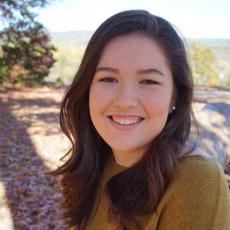
I focused on writing a scientific manuscript describing research from the summer of 2019, for which we manipulated floral traits to determine how they affect transmission of a bumble bee pathogen. I worked as a research assistant during this experiment and helped create tent microcosms with infected and uninfected bumble bee colonies. We allowed them to forage on manipulated or unmanipulated flowers to see if certain floral traits, such as shape or density, would affect pathogen transmission between the two colonies. This summer, our goal was to finish collecting and entering data, determine what effect the floral traits had on pathogen transmission, and write a manuscript describing our experiment and results. The project mainly involved myself, Dr. Jennifer Van Wyk, a postdoctoral researcher, and Dr. Lynn Adler, the P.I.
This summer, my role was to write parts of the manuscript about the effect of floral traits on pollinator disease transmission. The manuscript describes an experiment from last summer, when I worked as a research assistant to Dr. Van Wyk. This year I worked with the same postdoctoral researcher to write a manuscript describing the experiment. My goal was to write the introduction, discussion, and the methods to help complete the manuscript, and help collect and input data.
Throughout the summer, I read papers on floral traits and disease transmission, wrote and revised multiple drafts of my sections, and met regularly with my P.I. and postdoctoral researcher to help guide my writing. In addition, I helped to collect and enter data from last summer and new data from this summer. Mainly, this included wing measurements of bees from the experiment, which is used as a measure of bee size and is important when describing pathogen loads in individuals. I also learned about statistics and statistical programs from the postdoctoral researcher, who allowed me to sit in while she went over the data from the experiment. Overall, I feel very fortunate to have been given a larger role on this project after becoming involved in this experiment last summer.
In the future, I would like to work in a career focusing on science communications. I feel that communication is an essential aspect of science that is sometimes overlooked, and so I want to work towards improving communications and interest both within the scientific community and with the public. Because of this, I feel that it is important that I learn and understand multiple types of science writing.
Writing a manuscript, and thoroughly understanding the process, are very important elements of being a scientist. Science students read many research manuscripts but do not always have the opportunity to write them until they reach graduate school. There are many elements to scientific papers that can only be understood by being involved in the process. For example, receiving reviewer feedback and revising the manuscript only involves the authors of the paper. As someone who wants to work between the scientific community and the non-scientific public, I want to completely understand the process of manuscript writing so that I can “unveil the mystery” of science writing to people who are uninvolved in it. I am also excited that this manuscript describes research experiments that I worked on and thoroughly understand, and that I will see this project from experiment to published paper. I feel extremely fortunate to have been given the opportunity to collaborate closely and independently write significant sections of the paper while being guided by both Dr. Adler and Dr. Van Wyk. I learned a lot about writing, communication, and research by being involved in this project and I am very excited to continue working on this manuscript until its publication.